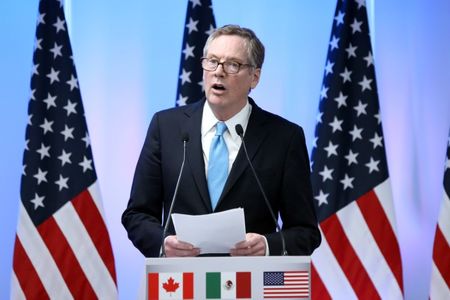

Investing.com – Reports last week indicated that Robert Lighthizer may not take a role in the incoming Trump administration. This development was unexpected, given that Lighthizer was a key figure behind the tariff strategies introduced during Trump's first term and shared the president-elect's firm position on trade negotiations.
In a recent note, Deutsche Bank (ETR:) Strategists discussed the potential implications of Lighthizer's absence, placing it within the broader context of Trump's recent comments on tariffs.
First and foremost, despite Lighthizer's likely absence, tariffs remain “likely,” as strategists at Deutsche Bank point out, with President-elect Trump reiterating his belief in their effectiveness in a recent NBC interview.
Trump threatened to increase tariffs on major trading partners, including Mexico, Canada, China and the BRICS countries. Jamison Greer, Trump's pick for U.S. Trade Representative, and Peter Navarro, appointed as senior adviser on trade and manufacturing, are seen as proponents of tough trade policies.
“We therefore continue to expect further tariffs, with or without Lighthizer,” strategists led by Matthew Luzetti said in a note.
However, the composition of Trump's economic team suggests a nuanced approach to tariffs. Treasury Secretary nominee Scott Besent has called for the strategic application of tariffs, while Commerce Secretary nominee Howard Lutnick views them as a “bargaining chip” to lower trade barriers to US exports.
“So, while tariffs may be coming, there will be voices in the room that will act as a counterweight to hawkish sentiment on trade. We will view a global base tariff as most at risk here,” the strategists noted.
Markets and trading partners may interpret Lighthizer's absence as a softening of US trade policy. According to Deutsche Bank, “Trump is unlikely to want to send this signal.”
In order to maintain a firm stance, strategists said Trump may increase rhetoric on tariffs to emphasize their importance to his administration's agenda. Recent threats to increase tariffs on Canada, Mexico, and the BRICS countries are examples of this approach.
Without Lighthizer's extreme tariff strategy, strategists believe the economic outlook could see some benefits.
A less aggressive tariff policy from the outset may reduce the risk of a major supply shock to the economy. As a result, the bank sees an improvement in the distribution of growth and inflation results, albeit marginally.







